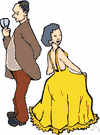scorn
(redirected from scorns)Also found in: Thesaurus, Idioms.
scorn
(skôrn)n.
1.
a. Contempt or disdain felt toward a person or object considered despicable or unworthy: viewed his rivals with scorn.
b. The expression of such an attitude in behavior or speech; derision: heaped scorn upon his rivals.
c. The state of being despised or dishonored: held in scorn by his rivals.
2. Archaic One spoken of or treated with contempt.
tr.v. scorned, scorn·ing, scorns
1. To consider or treat as contemptible or unworthy: an artist who was scorned by conservative critics.
2. To reject or refuse with derision: scorned their offer of help. See Synonyms at despise.
3. To consider or reject (doing something) as beneath one's dignity: "She disapproved so heartily of Flora's plan that she would have scorned to assist in the concoction of a single oily sentence" (Stella Gibbons).
[Middle English, from Old French escarn, of Germanic origin.]
scorn′er n.
scorn′ful adj.
scorn′ful·ly adv.
scorn′ful·ness n.
American Heritage® Dictionary of the English Language, Fifth Edition. Copyright © 2016 by Houghton Mifflin Harcourt Publishing Company. Published by Houghton Mifflin Harcourt Publishing Company. All rights reserved.
scorn
(skɔːn)n
1. open contempt or disdain for a person or thing; derision
2. an object of contempt or derision
3. archaic an act or expression signifying contempt
vb
4. to treat with contempt or derision
5. (tr) to reject with contempt
[C12 schornen, from Old French escharnir, of Germanic origin; compare Old High German scerōn to behave rowdily, obsolete Dutch schern mockery]
ˈscorner n
ˈscornful adj
ˈscornfully adv
ˈscornfulness n
Collins English Dictionary – Complete and Unabridged, 12th Edition 2014 © HarperCollins Publishers 1991, 1994, 1998, 2000, 2003, 2006, 2007, 2009, 2011, 2014
scorn
(skɔrn)n.
1. open or unqualified contempt; disdain.
2. an object of derision or contempt.
3. a derisive or contemptuous action or speech.
v.t. 4. to treat or regard with contempt or disdain.
5. to reject or refuse with contempt or disdain: She scorned my help.
v.i. 6. to mock; jeer.
[1150–1200; (n.) Middle English scorn, scarn < Old French escarn < Germanic (compare Old Saxon skern mockery); (v.) Middle English skarnen, sc(h)ornen]
scorn′er, n.
syn: See contempt.
Random House Kernerman Webster's College Dictionary, © 2010 K Dictionaries Ltd. Copyright 2005, 1997, 1991 by Random House, Inc. All rights reserved.
scorn
Past participle: scorned
Gerund: scorning
| Imperative |
|---|
| scorn |
| scorn |
Collins English Verb Tables © HarperCollins Publishers 2011
ThesaurusAntonymsRelated WordsSynonymsLegend:
Switch to new thesaurus
| Noun | 1. |  scorn - lack of respect accompanied by a feeling of intense dislike; "he was held in contempt"; "the despite in which outsiders were held is legendary" scorn - lack of respect accompanied by a feeling of intense dislike; "he was held in contempt"; "the despite in which outsiders were held is legendary"dislike - a feeling of aversion or antipathy; "my dislike of him was instinctive" |
| 2. | scorn - open disrespect for a person or thing discourtesy, disrespect - an expression of lack of respect fleer - contempt expressed by mockery in looks or words sneer - a contemptuous or scornful remark | |
| Verb | 1. | scorn - look down on with disdain; "He despises the people he has to work for"; "The professor scorns the students who don't catch on immediately" detest, hate - dislike intensely; feel antipathy or aversion towards; "I hate Mexican food"; "She detests politicians" look down on - regard with contempt; "the new neighbor looks down on us because our house is very modest" |
| 2. |  scorn - reject with contempt; "She spurned his advances" scorn - reject with contempt; "She spurned his advances" |
Based on WordNet 3.0, Farlex clipart collection. © 2003-2012 Princeton University, Farlex Inc.
scorn
noun
1. contempt, disdain, mockery, derision, despite, slight, sneer, sarcasm, disparagement, contumely, contemptuousness, scornfulness They greeted the proposal with scorn.
contempt respect, esteem, admiration, acceptance, affection, worship, tolerance, high regard, toleration, veneration
contempt respect, esteem, admiration, acceptance, affection, worship, tolerance, high regard, toleration, veneration
verb
1. despise, reject, disdain, slight, scout (archaic), snub, shun, be above, spurn, rebuff, deride, flout, look down on, scoff at, make fun of, sneer at, hold in contempt, turn up your nose at (informal), contemn, curl your lip at, consider beneath you People scorn me as a single parent. people who scorned traditional methods
despise respect, admire, esteem, accept, worship, tolerate, revere, venerate, look favourably on
despise respect, admire, esteem, accept, worship, tolerate, revere, venerate, look favourably on
Quotations
"Heav'n has no rage, like love to hatred turn'd,"
"Nor Hell a fury, like a woman scorn'd" [William Congreve The Mourning Bride]
"Heav'n has no rage, like love to hatred turn'd,"
"Nor Hell a fury, like a woman scorn'd" [William Congreve The Mourning Bride]
Collins Thesaurus of the English Language – Complete and Unabridged 2nd Edition. 2002 © HarperCollins Publishers 1995, 2002
scorn
nounverbTo regard with utter contempt and disdain:
Idioms: have no use for, look down on.
The American Heritage® Roget's Thesaurus. Copyright © 2013, 2014 by Houghton Mifflin Harcourt Publishing Company. Published by Houghton Mifflin Harcourt Publishing Company. All rights reserved.
Translations
إحْتِقار، إسْتِهْزاء، إزْدِراءيَحْتَقِر، يَزْدَري، يَسْتَخِف بِ
opovrhovatpohrdánípohrdat
foragthåne
halveksiahalveksuatorjua
fyrirlítafyrirlitning
軽蔑
niekinantisniekinimaspaniekinantispaniekinimaspaniekinti
apnicinātnicinājums
prezirprezirati
küçümsemeküçümsemek
scorn
[ˈskɔːn]Collins Spanish Dictionary - Complete and Unabridged 8th Edition 2005 © William Collins Sons & Co. Ltd. 1971, 1988 © HarperCollins Publishers 1992, 1993, 1996, 1997, 2000, 2003, 2005
scorn
[ˈskɔːrn] n → mépris m
This suggestion was greeted with scorn → La suggestion fut accueillie avec mépris.
to pour scorn on sb → traiter qn avec mépris
to pour scorn on sth → traiter qch avec mépris
to heap scorn on sb/sth → traiter qn/qch avec mépris
This suggestion was greeted with scorn → La suggestion fut accueillie avec mépris.
to pour scorn on sb → traiter qn avec mépris
to pour scorn on sth → traiter qch avec mépris
to heap scorn on sb/sth → traiter qn/qch avec mépris
Collins English/French Electronic Resource. © HarperCollins Publishers 2005
scorn
n (= disdain) → Verachtung f; (verbal also) → Hohn m; to laugh somebody/something to scorn → jdn/etw höhnisch verlachen; to pour or heap scorn on somebody/something → jdn/etw verächtlich abtun; to arouse somebody’s scorn → jds Verachtung ernten
vt (= treat scornfully) → verachten; (condescendingly) → verächtlich behandeln; (= turn down) gift, advice → verschmähen; idea → mit Verachtung von sich weisen; to scorn to do something → es für seiner (gen) → unwürdig halten, etw zu tun; to scorn somebody as something → jdn verächtlich als etw abtun
Collins German Dictionary – Complete and Unabridged 7th Edition 2005. © William Collins Sons & Co. Ltd. 1980 © HarperCollins Publishers 1991, 1997, 1999, 2004, 2005, 2007
scorn
[ˈskɔːn]2. vt (gen) → disprezzare; (attempt) → ridicolizzare; (advice, offer) → respingere con sdegno
to scorn to tell a lie (frm) → rifiutarsi sdegnosamente di dire una bugia
to scorn to tell a lie (frm) → rifiutarsi sdegnosamente di dire una bugia
Collins Italian Dictionary 1st Edition © HarperCollins Publishers 1995
scorn
(skoːn) noun contempt or disgust. He looked at my drawing with scorn.
verb to show contempt for; to despise. They scorned my suggestion.
ˈscornful adjective1. feeling or showing scorn. a scornful expression/remark.
2. making scornful remarks. He was rather scornful about your book.
ˈscornfully adverbˈscornfulness noun
Kernerman English Multilingual Dictionary © 2006-2013 K Dictionaries Ltd.